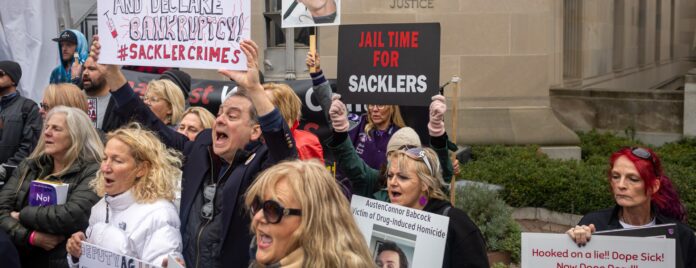The US Supreme Court signaled a likely divide over Purdue Pharma LP-bsp-bb-link>’s $6 billion opioid settlement, as the justices weighed Biden administration contentions that the accord improperly shields the Sackler family members who own the company.
In a Monday argument that cut across the court’s normal ideological divides, some justices questioned whether the Sacklers should get the benefit of a legal shield when they haven’t filed for bankruptcy themselves.
“Why should they get the discharge that usually goes to a bankrupt person once they’ve put all their assets on the table, without having put all their assets on the table?” Justice
The case threatens a bankruptcy reorganization plan that would end a mountain of litigation against the OxyContin maker and funnel money toward efforts to abate the opioid crisis. As part of the accord, family members have agreed to give up ownership of the company and pay as much as $6 billion.
Purdue Pharma is urging the Supreme Court to let the accord go forward, as are advocates for tens of thousands of opioid victims. They say the funds are urgently needed to address the nation’s opioid crisis.
A ruling against the plan could upend a key tool,-bsp-bb-link> known as non-consensual third-party releases, used in almost every big settlement. Purdue Pharma’s lawyer,
He drew support from Justice
Sex-Abuse Cases
Congress authorized similar maneuvers decades ago in bankruptcies related to asbestos lawsuits, and over time lawyers and judges have used the approach to address an array of corporate wrongdoing. Similar deals have ended mass litigation over dangerous products and waves of sex abuse claims against Catholic dioceses, the Boy Scouts of America-bsp-bb-link> and USA Gymnastics-bsp-bb-link>.
But other justices suggested they agreed with contentions by the Justice Department and US Trustee William Harrington that federal bankruptcy courts lack the power to insulate the Sacklers from lawsuits.
“We don’t normally say a non-consenting party can have its claim for property eliminated in this fashion without consent or any process of court,” Justice
Justice
Another Deal?
The victims’ lawyer, Pratik Shah-bsp-person>, told the justices the settlement will collapse unless the court upholds it. “There is no better deal,” he said.
Justice Department lawyer Curtis Gannon took at different view, saying, “I do think that there’s a very good chance that there’s a deal on the other side of this.”
The Sacklers withdrew more than $10 billion from Purdue Pharma beginning in 2008. Nearly half of those transfers went to pay taxes and much of that remaining wealth was parked in offshore trusts that would make collecting any potential judgments from the Sacklers difficult, according to court documents.
Kagan was among several justices who asked probing questions of both sides. She said there was “overwhelming” support for this deal, “and among people who have no love for the Sacklers, among people who think that the Sacklers are pretty much the worst people on Earth.”
In a statement after the argument, Purdue Pharma said the accord “is the only way to deliver billions of dollars toward lifesaving opioid abatement programs and victim compensation.”
The case, which the court will resolve by the middle of next year, is Harrington v. Purdue Pharma, 23-124.
(Updates with comments from Gannon, Kagan starting in 14th paragraph.)
To contact the reporters on this story:
Jonathan Randles-bsp-person> in New York at [email protected]
To contact the editors responsible for this story:
Elizabeth Wasserman-bsp-person> at [email protected]
Anthony Aarons
© 2023 Bloomberg L.P. All rights reserved. Used with permission.
